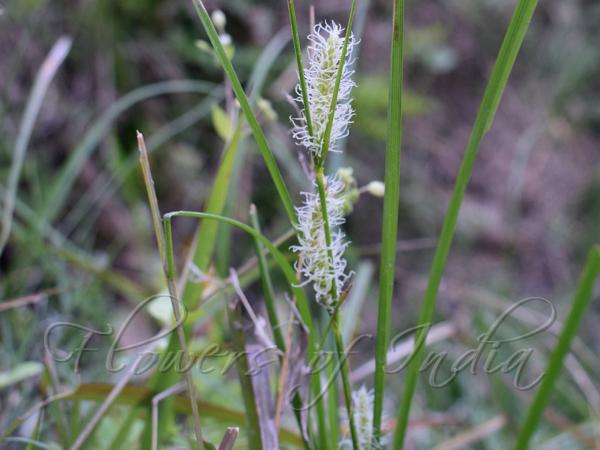|
| Valerian Sedge |
|

|

| File size | 312943 |
| Original date | 5/7/19 12:27 AM |
| Resolution | x |
| Flash | Flash did not fire, auto |
| Focal length | 25.0mm |
| Exposure time | 1/125s |
| Aperture | 5.6 |
| Focus Distance | |
| Metering Mode | $meteringMode |
| Camera make | NIKON CORPORATION |
| Camera model | NIKON D5300 |
| Sensor type |
|
|
|
|
Photo: |
Botanical name: Carex fedia Family: Cyperaceae (Sedge family)
Synonyms: Carex chaetogyne, Carex sinomairei, Carex wallichiana
Synonyms: Carex chaetogyne, Carex sinomairei, Carex wallichiana
Valerian Sedge is a clustered perennial herb, 25-60
cm, with long underground runners. The species name is probably in
allusion to Fedia, the old name for Valerian plants. Stem is
sharply trigonous, smooth. Leaves equal stem length; sheaths 1.5-7 cm,
dark to light brown, disintegrating into often net-like fibres. Leaves
are 2-4 mm wide, flat to somewhat curled, long-tapering, margins and
main veins scabrous. Inflorescence have 1-3 male spikes grouped closely
together, 1-3 female spikes remote. Bracts are sheath-less, equalling
inflorescence. Male spikes are 12-30 x 2-3 mm, from pale yellow to
light brown, glumes 4.5-6 x about 1.6 mm, obovate, blunt, scarious.
Female spikes are 8-25 x 4-7 mm, from almost globular to cylindrical;
glumes 3.7-4.2 x 1.6-2 mm, triangular, pointed, midnerve area green,
3-nerved, margins widely scarious. Valerian Sedge is found in wet
meadows, along ditches, in the Himalayas, from Afghanistan to Central
China and SE Asia, at altitudes of 400-3400 m. Flowering: March-June.
| Identification credit: Ashutosh Sharma | Photographed in Hamirpur, Himachal Pradesh. |
• Is this flower misidentified? If yes,